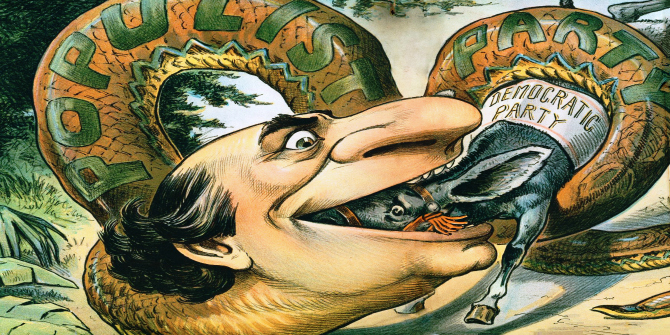In The Populist Temptation: Economic Grievance and Political Reaction in the Modern Era, Barry Eichengreen places the surge of new populisms within deep historical context, looking at the convulsions caused by populist agitators and the response from the political establishment. Diogo Senra Rodeiro recommends this clear and highly informative analysis.
The Populist Temptation: Economic Grievance and Political Reaction in the Modern Era. Barry Eichengreen. Oxford University Press. 2018.
Any project grounded in an analogy of times past with the present will likely be a good guide for the future, or perhaps it will rather be valued as the latest testimony to the historical ignorance of the current generation.
This is what may be said of The Populist Temptation, Barry Eichengreen’s clear, highly informative and non-ideological analysis of the inflammatory surge of new populisms, with a Western focus – looking primarily at the United States, the United Kingdom and Germany, with some French and Italian interludes. At the core of the book is deep research into the convulsions caused by populist agitators and the response from the political establishment. As a historian, but especially an economic one, Eichengreen certainly delivers.
The book’s title suggests that a political economy analysis will ensue. Some rather important figures are followed by graphs that add richness to the analysis, though the significance of sociology is also not forgotten by the author. At the very start one is faced with Eichengreen’s definition of this oblique phenomenon – populism – that is casting its shadow over the world once again: ‘a multidimensional phenomenon, with multiple perspectives on each dimension […] a political movement with anti-elite, authoritarian, and nativist tendencies’ (1).
In the present time, many similarities exist between the current period and the 1920s and 1930s; if for some this is only a suspicion, the evidence grounded in the past, which Eichengreen highlights throughout his book, rightly proves that we might be repeating those dark times.
Indeed, Eichengreen goes back in time even further so we can fully acknowledge that we are not experiencing something new, and that this unusual ‘species’ of social visionary – the populist – has been around ever since the capitalist economy began functioning as it does. Accordingly, those positioned as ‘other’ or the ‘undesirables’ through these movements also existed in the nineteenth century.
 Image Credit: 1896 Judge cartoon shows William Jennings Bryan/Populism as a snake swallowing up the mule representing the Democratic party (Wikipedia Public Domain)
Image Credit: 1896 Judge cartoon shows William Jennings Bryan/Populism as a snake swallowing up the mule representing the Democratic party (Wikipedia Public Domain)
Eichengreen deems the process of commercialisation akin to what Ellen Meiksins Wood (2002) called ‘market dependence’ – the social phenomenon stemming from the Industrial Revolution, or perhaps even earlier when enclosures were premiered in England. Being pushed to go to the market in order to afford a living by selling their agricultural produce now that the land was no longer common property – hence the market dependence – farmers were unleashed into a highly volatile social condition, one that fanned their political support for populist alternatives, especially from the mid-nineteenth century onwards. Bearing in mind this period is of utter relevance, given that the economy was becoming more and more internationally connected, which meant that local realities were now being shaped by overseas events.
At the same time, political elites still possessed an awareness of what was best (or better) for society. Or, at least, there was a clearer impression held by the people of some of their efforts to hamper the effects of the global economic architecture that was on the make – even if the people couldn’t ascertain that the origin of the problem was coming from this emerging system. Nonetheless, conscious awareness was originally generated outside of the political world of government, from intellectual circles such as the Fabian Society and the German Historical School that were pivotal in coming up with alternatives for social problems. Social innovation by governments did not emerge from the void, and most times it simply turned into a mimetic exercise from country to country, while taking into account their existential differences.
Thus, the social cohesion of the countries analysed always reflected the dissatisfaction at the level of its working class, or the ones more prone to feel economic hardships – they did have a voice. This coincided with a time when the body politic still had the (will to) power to address the social peace of their territories, and so manifestations of populism were always diminished by the implementation of social programmes that have been slowly created: ‘They indicated that the political class was listening’ (45).
In the book, you can always find this exercise: first, an account of populist upheavals in different countries; and second, what politicians did to solve them, the political response. But in our times, the unrest has been noticeably grander, while the responses are much feebler than in the past. This is the main question posed by Eichengreen: how is it that the countries that never, or rarely, had populist manifestations can possibly be menaced now? When did politicians start to say no to their societies?
That said, it is important not to ignore the key role that the economy has played for societies, especially ones purely underpinned by money, the amount you get directly influencing your standard of living. If in these cases the economy starts working unequally or slowly, the economy works as a fan for the angst of the people. And this anger was triggered by the politics of depoliticisation (Burnham 2001) set en marche by neoliberalism. If periods of no-growth extend for too long – as they did, for instance, in Germany post-World War One – populations will start (once again) pointing the finger at the ‘other’, especially those in a more fragile position – in Europe, for instance, the refugees.
Not even the ‘supra-democratic’ European Union (EU) is capable of producing alternative thinking: different social programmes for stopping the engagement of the people with new populist leaders. Eichengreen even writes that ‘the EU is an elite project, having been pushed on reluctant publics by intellectuals and high officials since the days of Jean Monnet’ (144) Given this perception, Europe’s response to the post-World War Two situation – the EU, at the time EEC – now is but another motivation for the likes of Hungary, Poland, Austria and the Netherlands (countries unfortunately not addressed and where there have been some blatant manifestations of the new populisms) and their populists.
The only domain in which we may feel there is real social involvement is the technological world. Yet this has often been used by the above-mentioned populists, whether through the radio in the United States at the turn of the century, the newspaper for propaganda or social media that is now influential in deciding elections. In the age of ‘spectator democracy’, there is no political ‘we’ prone to emerge. This reality gives the floor to electoral victories such as the one in Brazil, where Jair Bolsonaro did not participate in democratic debates with other candidates. The sine qua non element of any democracy – debate – is disappearing. We are left alone with technologies that we think belongs to us, although they have often historically functioned to support the populist agenda.
If world leaders don’t convince themselves that the economy needs to flourish in order to secure social stability through real growth-fostering measures, then there will always be someone who will come up with simplistic claims, and quite often lies, in order to secure people’s political support. Once again history – and Eichengreen in this book – provides us with one or two examples of what such a public endorsement might cause. Eichengreen also leaves us with some prospects and, most importantly, a thought-provoking statement:
The failure of twenty-first century politicians to make this connection [between economic growth and populism] is either a failure of courage, to the extent they are intimidated by hardcore ideological opponents of government action, or a simple failure of logic (152).
Diogo Senra Rodeiro is an Economic Diplomacy intern at the Embassy of Portugal in New Delhi, India. Prior to this, he completed the MSc Global Economic Governance and Policy at the School of Oriental and African Studies (SOAS), having studied for his BSc International Relations at the University of Coimbra, Portugal. His main interests gravitate around political economy, economic sociology, philosophy and literature.
Note: This review gives the views of the author, and not the position of the LSE Review of Books blog, or of the London School of Economics.


 Find this book:
Find this book: 





3 Comments